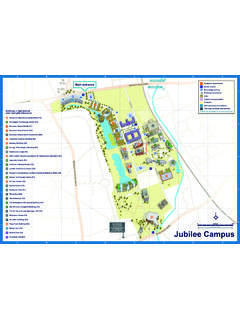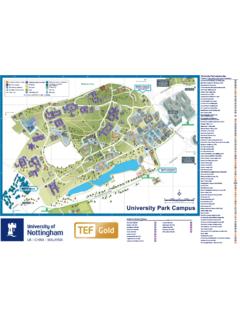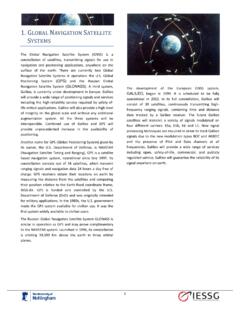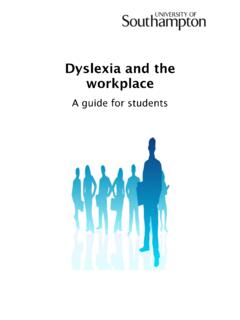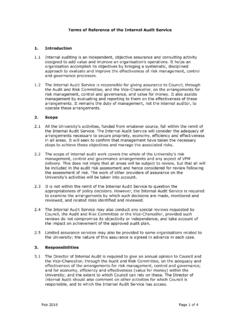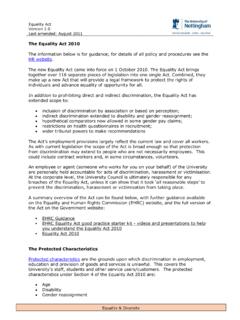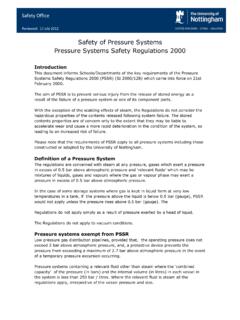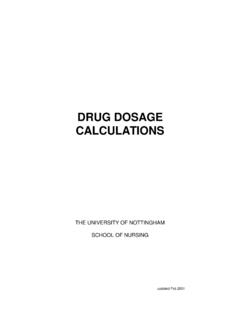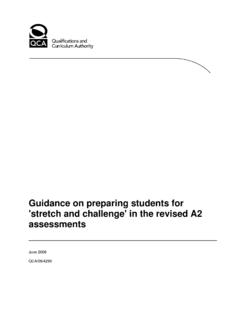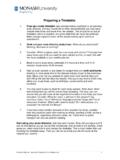Transcription of Planning and preparing to write assignments An …
1 Academic Support, Student Services 1 Planning and preparing to write assignments An Academic Support Handbook for students Academic Support, Student Services 2 Introduction to Planning and preparing to write assignments This handbook on preparing to write assignments is designed to help you develop your strategies for Planning . Hopefully, it will help you to get the most out of your experience of writing at University and provide encouragement for managing this type of assessment. A list of useful resources referred to here is provided at the end of the handbook. - What sort of writer are you? o Writing University-level assignments o Where and when to work on writing tasks - Understanding the question: Process words o Focusing on the content or topic o Course and subject-specific types of writing - Planning your writing o Types of Planning spider diagrams / Mind Mapping , outlines, lists o Planning assignments by paragraphs o Help!
2 Planning does not work for me! - Start thinking critically o Using SQ3R for reading and notetaking - Gathering information and keeping good records o Building your list of sources - preparing for writing: presentation and style o Academic conventions About this handbook This handbook has been written and compiled for the students at the University of Nottingham by Dr Lisa Rull with assistance from Lynette Outram and Dr Barbara Taylor. It has drawn on the teaching experience of the University of Nottingham Academic Support team and their associated hand-out material. The package on study skills for mature students produced initially by Dr Mark Dale for the former School of Continuing Education (now Centre for Continuing Education, part of the School of Education) has proven helpful.
3 A list of Useful sources is also provided at the end of the document. Updated September 2014 Academic Support, Student Services 3 What sort of writer are you? Creme and Lea (1997) identified four types of writer: you may recognise yourself in one of these, or may find you use a combination of approaches. The diver writer The diver leaps straight in and starts the writing process early on, in order to find out what she wants to say. The diver starts anywhere to see what emerges, before working towards a plan. The patchwork writer The writer works on sections (perhaps using headings) quite early in the process, and combines with linking ideas and words later The grand plan writer This person reads and makes notes, and leaves writing a plan or beginning writing until they have an almost complete picture of the essay ready in their head The architect writer The architect has a sense of the structure (perhaps before the content)
4 And could produce a complex plan or spider diagram early in the process Academic Support, Student Services 4 Writing University-level assignments Further advice is available from Studying Effectively which has a section on Writing This site includes a number of video clips of students talking about writing at University. Academic Support, Student Services 5 Where and when to work on writing tasks (1) It can be helpful to think about where you need to be to prepare, produce and revise your writing. You may not want to work through all the stages in the same location; for example, you may prefer to prepare for writing in the library (so you can easily access resources) or you may prefer to prepare in your room/accommodation (so you are not tempted to gather too many materials).
5 Choosing the right space to work in Your room (study / bedroom) Library / resource centre at University Another room in the house Computer room at University (kitchen / living room table) Elsewhere ( caf ) What are the benefits of the location accessibility to materials (lecture notes, books), 24-hour access (opening hours)? What problems may you experience distractions from family/friends, noise? Academic Support, Student Services 6 Where and when to work on writing tasks (2) The furniture and environment Your desk: have you got a clear working space? Your chair: are you comfortable and supported? Can you sit near a window (for natural light and ventilation)? Is the lighting bright enough / too bright?
6 Do you need a spotlight? Clocks: does it help to have a clock visible? Noise and sound Does listening to music help you concentrate? Sometimes, certain types of music can help with concentration (usually instrumental music, such as classical music). Do you prefer to listen to music on headphones or via speakers? What impact could this have on your neighbours or family? Do you prefer silence? Is the University library too noisy or too quiet for you? Time of day for working: when and how long Is this a productive time of the day to work? You may prefer to do certain tasks at a particular time of the day. Are you a morning person? If you are alert early in the day, you may want to reading or writing tasks now. Do you prefer to work in long chunks of time?
7 Check out our Handbook on Revision and Exams which may help you understanding more about your learning style and how memory works. Think carefully about the consequences of working late at night how this may affect your eating and sleeping patterns, as well as attending lectures. Academic Support, Student Services 7 Understanding the question: Process words It is important to understand what the question is asking you to do. The process word or instruction identifies this. Below is a list of common process words : Account for Explain why something happens, clarify, give reasons for Analyse Identify the main points and significant features. Examine critically and/or in great detail. Assess Identify the value of, weigh up (See also Evaluate) Comment on Identify the main issues, providing reactions and evidence (examples, sources, authors) to support your points.
8 Avoid personal opinions lacking supporting evidence. Compare Show similarities between two (or more) things. Indicate relevance, importance and consequence of these similarities. Contrast Show differences between two (or more) things. Indicate relevance, importance and consequence of these differences. If appropriate, justify why one item/argument may be more convincing or preferred. Compare and contrast Show the similarities and differences between two (or more) things. Criticise Make a judgement based on and using examples, evidence and reasoning about the merit of two or more related things: for example, theories, opinions, models, items. Critically evaluate Weigh arguments for and against something, indicating and then assessing the strength of the evidence on both sides.
9 Be clear about your criteria for how you judge which side is preferable/more convincing. Define Provide the exact meaning or a word, concept or phrase. Where appropriate you may need to identify other alternative definitions and/or disagreements about the definition. Describe Give the main characteristics or features of something, or give a detailed account of it. Discuss Explain and give arguments for and against an issue; consider the implications of. Provide evidence to support your points. Often used in connection with a quotation or statement that can be disputed. Distinguish or differentiate between Look for differences Evaluate Assess the worth, importance, validity, effectiveness of something using evidence. There will probably be a case both for and against (see Assess) Examine Look in detail this may also involve critical evaluation as well Explain Clearly identify why something happens or why it is the way that it is.
10 How Usually involves looking at evidence/arguments for and against and weighing them up. (see also To what ) Academic Support, Student Services 8 Understanding the question: Process words (continued) Illustrate Make clear and explicit, usually requiring carefully chosen examples Interpret Give the meaning and relevance of date or other material Justify Provide evidence supporting an argument/point of view/idea. Show why a decision or conclusions are made, considering and exploring objections. Narrate Focus on what happened as a series of events Outline Give only the main features or points on a topic, omitting minor details and emphasising the main structure (see Summarise) Relate Show similarities and connections between two or more things State Give the main features in brief and clear form Summarise Draw out the main points only (see Outline) To what extent Consider how far something is true and how convincing the evidence is, including any ways in which the proposition remains unproven (see also How ) Trace Follow the order of different stages in an event or process Process words list adapted from Cottrell (2003) The Study Skills Handbook.
